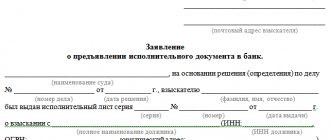Enforcement proceedings
Enforcement proceedings are a mechanism established by the state for implementing court decisions. Enforcement proceedings begin from the moment the resolution to open enforcement proceedings is issued and ends after the bailiff signs the resolution to terminate enforcement proceedings.
In some cases, in order to initiate enforcement proceedings, the recoverer (plaintiff in the claim) must submit to the bailiff an application about the need to initiate enforcement proceedings, attaching a writ of execution, which can be obtained in court.
Legislation on enforcement proceedings
There are two main laws governing the actions of bailiffs:
- Federal Law “On Enforcement Proceedings”, number 229-FZ.
- Federal Law “On Bailiffs”, numbered 118-FZ.
Concept
If the borrower, due to various circumstances, does not want to pay his debt obligations, then his creditor has the right to file a claim against him to recover the debt. At the end of the trial, a writ of execution is drawn up, which is subsequently handed over to the debtor.
Enforcement proceedings mean a list of measures that are used to fully satisfy a court order.
The responsibility for debt collection falls on the shoulders of the FSPP. The enforcement process begins after receiving an application from the applicant or by decision of the court.
The list of grounds on which records may be temporarily terminated is specified in Federal Law No. 229, Articles 39-40.
Stages of enforcement proceedings
Enforcement proceedings can be divided into several stages:
- initiation of enforcement proceedings. At this stage, the claimant submits to the bailiff an application for the need to initiate enforcement proceedings;
- notification by the bailiff of the debtor of the need to voluntarily fulfill the requirements contained in the writ of execution and an indication of the negative consequences for him in case of refusal;
- if the debtor refuses to voluntarily comply with the order of the bailiff, then the latter begins to search for funds and other property of the debtor;
- seizure of the debtor's funds, and if they are insufficient, property;
- transfer of funds from the debtor’s account, and in case of shortage, sale of the debtor’s property with subsequent transfer of the proceeds to the recoverer. Excess funds received from the sale of property are transferred to the debtor minus the costs of enforcement proceedings;
- termination of enforcement proceedings. After the above enforcement actions are completed, the bailiff issues a resolution to terminate the enforcement proceedings in connection with its execution.
The above stages are conditional and vary depending on the situation. The bailiff may suspend enforcement proceedings, terminate it without penalty, etc. For the collector, it is necessary to monitor the actions of the bailiff and appeal against his unlawful actions or inactions to the senior bailiff, the prosecutor's office and the court.
Resumption of enforcement proceedings after its completion - grounds
If the collection action has expired due to the expiration of the statute of limitations, this does not mean that the plaintiff cannot resume it. There are no clear deadlines within which this can be done. The basis for initiating debt collection proceedings may be the acquired property of the debtor, which is suitable for collection as payment of the debt. In order to restore this process, you need to write a corresponding application to the Office of the Federal Bailiff Service. It must be reviewed within ten days. If for some reason the bailiff did not resume his actions, then you can file a complaint about the failure to comply with higher authorities. The application itself should be forwarded to the court. Upon renewal of the process, the limitation period is calculated anew. Control over it remains with the bailiff.
Appeal against the decision to terminate enforcement proceedings, sample 2018
A citizen can appeal the decision to terminate enforcement actions before their statute of limitations expires. For this purpose, the legislation provides a period of 10 days. An appeal can be made by appealing to a senior bailiff, the prosecutor's office or the court. It is also possible to submit a corresponding application to the regional bailiff service. This ensures that decisions on this issue are taken under control. The collector will, within a short period of time, receive written notification of the measures taken to collect the debt by the bailiff. Depending on the authority to which the application is sent, the period for its consideration may vary. So for the Federal Bailiff Service and the court it will be 10 days, for the prosecutor’s office – 30. The most effective way is to file a complaint at the same time to all these services. This is not prohibited at the legislative level.
The appeal must contain the following information:
- a detailed and structured description of what happened;
- list of actions performed by the bailiff;
- an indication of the offenses that were committed;
- a list of the applicant's requirements based on the above.
Thus, there are many different options, in addition to the end of the statute of limitations, for ending collection measures. However, even if the case was closed, it can be reopened by the relevant officials if the debtor has material assets suitable for payment.
Application for initiation of enforcement proceedings
As mentioned above, enforcement proceedings are most often initiated on the basis of an application from the claimant with a writ of execution (original) attached to it.
An application to initiate enforcement proceedings can be drawn up either in writing or in printed form. The application must be signed by the claimant or his representative; in the latter case, a copy of the power of attorney must be attached to the application. These are all the requirements that are specified in Article 30 of the Federal Law “On Enforcement Proceedings” for an application to initiate enforcement proceedings.
At the same time, this article also states that the claimant can indicate in this application information about the debtor: his location, bank accounts, personal property, in other words, all the information that can speed up the execution of enforcement proceedings.
According to Article 33 of the Federal Law “On Enforcement Proceedings”, enforcement proceedings are initiated:
| debtor status | place of initiation of enforcement proceedings |
| individual | at the place of residence, stay, location of the debtor’s property |
| entity | at the place of legal address, location of property, legal address of its branch or representative office |
Statute of limitations for enforcement proceedings by bailiffs
For enforcement proceedings, the statute of limitations is three years. At the same time, the time while the defendant avoided fulfilling his obligations is not included in this period. It is resumed after the place where he or his property is located (read about how to file a claim for foreclosure on the debtor’s property here:). That is, as such, there is no statute of limitations for the end of enforcement proceedings. There is a deadline for serving the writ of execution. Upon receipt by the responding party, the calculation ends. As a general rule, the time for carrying out enforcement actions is allowed within three years from the date of the court’s adoption of the relevant decision. Control over this issue is entrusted to bailiffs, who are executors.
Place and time of execution of enforcement actions
Measures to enforce a court decision, the place, as well as the permissible time for their implementation are regulated by Article 35 of the Federal Legislation. According to it, the application of exacting measures is carried out by bailiffs on weekdays, from 6 am to 10 pm. Exceptions include critical situations. These may be those that threaten the integrity of people’s lives or health, associated with the need for forced expulsion from the country of a citizen or stateless person. And also if the recovered property is subject to rapid deterioration.
The court decision itself can be recognized as immediate for execution. Then the time for action on it may go beyond what is provided by law. Exceptions are cases of collection of alimony. At the same time, in order to carry out collection actions outside the established time periods, the bailiff must have written permission to do so from an authorized person - the senior bailiff. According to the same article of the Federal Law of the Russian Federation, the collecting and responding parties have the right to offer the bailiff a similar time, which is convenient for carrying out enforcement actions.
The places of execution of a court decision are regulated by the thirty-third article of the Federal Legislation of the Russian Federation. It regulates the following provisions.
- If the party responsible for the court decision acts as an individual, then enforcement measures are taken at the place of his registration, stay or location of the recovered values.
- When a legal entity is a debtor, the place of enforcement actions becomes the legal address of the organization itself, as well as its branches, or the location of the recovered material assets belonging to it.
Deadlines in enforcement proceedings
The legislator regulated certain deadlines in enforcement proceedings.
| procedural action | deadlines |
| Transferring the application to the bailiff within the department | 3 days from the date of receipt of the application to the bailiff department |
| Issuance by the bailiff of a resolution to initiate enforcement proceedings or to refuse to initiate enforcement proceedings | 3 days from the date of transfer of the application to the bailiff within the department |
| Execution of enforcement proceedings | 2 months from the date of initiation of enforcement proceedings |
| Re-initiation of enforcement proceedings. The exception is cases when the debtor has acquired property that may be subject to foreclosure | 6 months from the date of termination of enforcement proceedings due to the debtor’s lack of property |
| Suspension of enforcement proceedings | Until the circumstances that served as the basis for suspension are eliminated (Article 41 229-FZ) |
| Appealing a decision, action or inaction of a bailiff | 10 days from the date of the decision, action or inaction. If the person does not know the time and place of the decision, action or inaction of the bailiff, then within 10 days from the moment it became known. |
Time limits in enforcement proceedings may be suspended (Article 19 229-FZ) or extended (Article 20 229-FZ). Also, according to Article 23 229-FZ, the deadlines can be restored.
Suspension of enforcement proceedings
Enforcement proceedings may be suspended. The bailiff or the court can suspend enforcement proceedings.
Enforcement proceedings are suspended until the grounds for which the enforcement proceedings were suspended are eliminated.
Suspension of enforcement proceedings by a bailiff
Grounds for suspension of enforcement proceedings at the initiative of the bailiff:
- death of the debtor;
- loss of legal capacity;
- participation of the debtor in hostilities as part of the Armed Forces of the Russian Federation;
- revocation of a credit institution's license;
- application of bankruptcy proceedings against the debtor.
In these cases, in accordance with Part 1 of Article 40 229-FZ, the bailiff is obliged to suspend enforcement proceedings. The above list of reasons is not complete.
There are also grounds that give the bailiff the right to suspend enforcement proceedings:
- the debtor is undergoing treatment in an inpatient facility;
- search for the debtor, his property or child;
- if the debtor has received a corresponding request, if he is in service in the Armed Forces of the Russian Federation
In all the cases described above, enforcement proceedings are suspended by the bailiff who is conducting the enforcement proceedings.
Also, the right to suspend enforcement proceedings is vested in the chief bailiff of the Russian Federation, the chief bailiff of the subject, as well as their deputies. They have the right to suspend enforcement proceedings if a complaint is received against the bailiffs subordinate to them.
The suspension of enforcement proceedings is carried out by the bailiff issuing a corresponding resolution, which can be appealed in the order of subordination or in court.
Suspension of enforcement proceedings by the court
The court is also vested with the power to suspend enforcement proceedings (Article 39 229-FZ). He is obliged to suspend enforcement proceedings in the following cases:
- receipt of a claim for release from seizure of property of third parties;
- challenging the result of the assessment of seized property before its sale;
- challenging the enforcement fee.
There are a number of other grounds on which the court is obliged to suspend enforcement proceedings.
There is also a list of circumstances under which the court has the right (not the obligation) to suspend enforcement proceedings (Part 2 of Article 39, Article 40 of the 229-FZ).
A court ruling to suspend enforcement proceedings can be appealed to a higher court.
Temporary termination of collection by bailiff
If the case is suspended by an FSPP officer, then there are two groups of reasons. It is necessary to terminate the enforcement process in the following cases:
- Loss of legal capacity by the borrower.
- Death or demise of the debtor.
- If the defaulter is a banking organization that has lost its license to operate.
- The debtor is undergoing insolvency proceedings.
- The borrower is participating in hostilities.
- A resolution has been submitted to the tax office to seize the property of the defaulter.
- Disagreement with the amount of the enforcement fee, expressed in the form of a petition.
Voluntary reasons for suspending debt collection activities include:
- The debtor is undergoing treatment in a day hospital.
- The debtor and his property are wanted.
- The defaulter is serving in the army.
Persons authorized to terminate the procedure:
- Chief Bailiff of the Russian Federation.
- Chief bailiff of a constituent entity of the Russian Federation.
- The deputies of these bailiffs.
Termination of enforcement proceedings
Termination of enforcement proceedings is the last stage in this process, which is based on a resolution to terminate enforcement proceedings signed by the bailiff. The bailiff makes such a decision in the following cases (Part 2 of Article 42 229-FZ):
- the court adopted an act terminating the validity of the document on which enforcement proceedings are carried out;
- the court accepted the claimant’s refusal to collect;
- approval by the court of a settlement agreement between the parties to enforcement proceedings;
- termination of the debtor-organization or the claimant-organization.
The above list is not complete.
According to Part 1 of Art. 42 229-FZ, enforcement proceedings have the right to terminate the court in the following cases:
- death of the creditor or debtor, in the absence of their legal succession;
- refusal of the debtor to receive an item seized from the debtor, if the writ of execution provides for the recovery of this item;
- if the debtor loses the opportunity to perform the action provided for by the writ of execution;
- in other cases.
The court's decision to terminate enforcement proceedings can be appealed.







